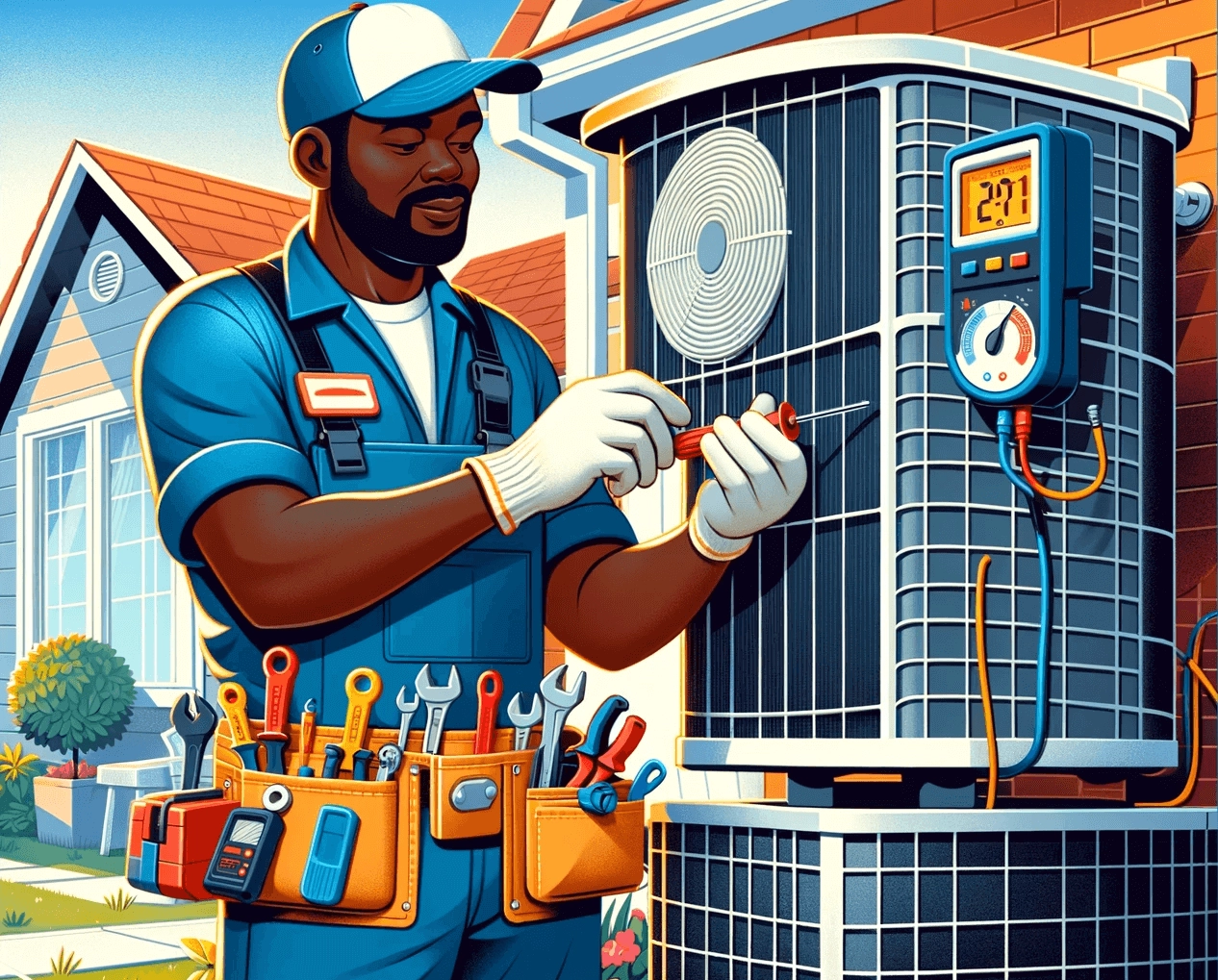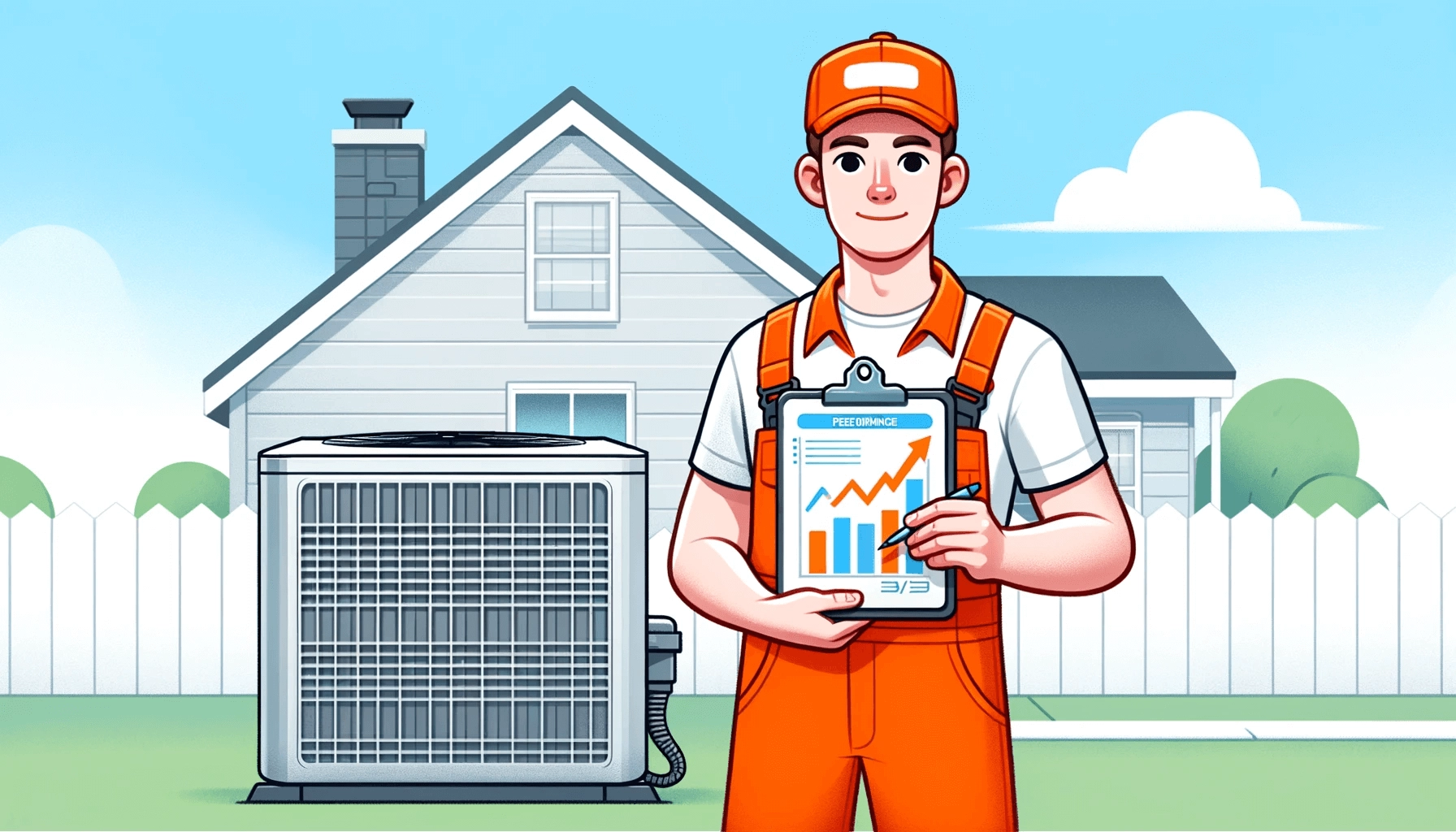Table of Contents
Welcome to our in-depth exploration of the HVAC technician salary. It’s more than just a number, it’s a reflection of skills, experience, and the ever-changing demands of the industry.
From dissecting state-by-state variations to unraveling the threads of specialization and experience, we’ll walk you through the layers of how much do HVAC techs make.

How Much Do HVAC Technicians Make
When discussing the HVAC technician salary, several factors come into play, including:
- Experience
- Location
- Specialization
- Additional skills like sales and customer service
- Consumer financing options
We will discuss how these factors affect HVAC technician salaries, but first, let’s look at some general numbers.
Average HVAC Salary
As of 2023, an average HVAC technician in the United States earns about $3,146 monthly after taxes, translating to roughly $723 per week. Bear in mind that this is a national average, and the figure may vary widely depending on the factors we mentioned earlier.
How Much Does an HVAC Technician Make Per Hour?
For those just starting out in their first five years, the average hourly wage is around $22. As HVAC technicians move into the mid-level phase of their career, between six to nine years of experience, their hourly wage typically increases to about $27. For seasoned professionals with over 10 years of experience, the hourly rate further climbs to approximately $32.
How Much Does an HVAC Tech Make Yearly?
In terms of experience, entry-level HVAC technicians, typically with less than 5 years of experience, earn an average of $45,760 per year. As their experience grows, so do their potential earnings. For example, technicians with 6-9 years of experience can average around $57,512 annually, and those with over 10 years of experience can earn about $68,286 per year.
HVAC Technician Salary by State
The HVAC tech salary varies significantly across the United States, reflecting regional differences in cost of living, demand for services, and local economic conditions. The table below presents the average hourly rate and yearly salary HVAC technicians receive in each state:
| State | Average Hourly Rate | Average Yearly Salary |
|---|---|---|
| Alabama | $19.10 | $40,891 |
| Alaska | $38.08 | $72,291 |
| Arizona | $23.36 | $47,472 |
| Arkansas | $18.33 | $38,799 |
| California | $34.01 | $62,310 |
| Colorado | $26.99 | $52,161 |
| Connecticut | $36.96 | $70,029 |
| Delaware | $27.26 | $57,998 |
| District of Columbia | $37.11 | $73,977 |
| Florida | $20.78 | $44,118 |
| Georgia | $21.99 | $46,238 |
| Hawaii | $22.68 | $54,288 |
| Idaho | $23.22 | $48,545 |
| Illinois | $27.03 | $58,579 |
| Indiana | $23.49 | $51,232 |
| Iowa | $23.12 | $49,607 |
| Kansas | $20.89 | $49,678 |
| Kentucky | $21.73 | $43,180 |
| Louisiana | $25.96 | $47,574 |
| Maine | $24.52 | $51,337 |
| Maryland | $33.85 | $68,097 |
| Massachusetts | $37.63 | $68,489 |
| Michigan | $24.33 | $50,344 |
| Minnesota | $26.89 | $57,083 |
| Mississippi | $21.38 | $42,890 |
| Missouri | $20.49 | $45,509 |
| Montana | $24.76 | $47,945 |
| Nebraska | $22.20 | $48,144 |
| Nevada | $26.18 | $56,743 |
| New Hampshire | $26.60 | $56,254 |
| New Jersey | $34.97 | $65,871 |
| New Mexico | $21.08 | $42,454 |
| New York | $27.16 | $60,535 |
| North Carolina | $21.94 | $46,105 |
| North Dakota | $27.61 | $53,262 |
| Ohio | $24.65 | $51,609 |
| Oklahoma | $21.42 | $44,527 |
| Oregon | $26.65 | $57,729 |
| Pennsylvania | $24.22 | $55,845 |
| Rhode Island | $33.74 | $61,310 |
| South Carolina | $21.64 | $46,065 |
| South Dakota | $22.51 | $45,081 |
| Tennessee | $20.57 | $41,154 |
| Texas | $22.62 | $47,583 |
| Utah | $21.17 | $48,143 |
| Vermont | $22.54 | $51,046 |
| Virginia | $26.73 | $57,298 |
| Washington | $32.26 | $66,491 |
| West Virginia | $19.63 | $40,924 |
| Wisconsin | $23.63 | $51,528 |
| Wyoming | $25.29 | $49,717 |
States with the Highest Entry-Level HVAC Technician Salaries
If you’re kicking off a career as an HVAC technician, location matters. States like California and New Jersey, known for their higher living costs, tend to offer higher starting salaries to compensate.
These are the top 10 states where entry-level HVAC technicians earn the most:
| State | Average Hourly Rate | Average Annual Salary |
|---|---|---|
| California | $27.79 | $57,800 |
| New Jersey | $26.73 | $55,600 |
| Connecticut | $26.73 | $55,600 |
| Washington | $26.54 | $55,200 |
| Massachusetts | $26.49 | $55,100 |
| Alaska | $25.00 | $54,600 |
| New York | $24.68 | $53,900 |
| Hawaii | $24.31 | $53,100 |
| New Hampshire | $24.22 | $52,900 |
| Rhode Island | $24.17 | $52,800 |
States with the Highest Senior HVAC Technician Salaries
Experienced HVAC technicians can expect higher salaries, especially in states with certain economic characteristics like growing industries and higher living costs.
This table showcases the states where senior technicians, typically with 10 years of experience and more, earn the most:
| State | Average Hourly Rate | Average Annual Salary |
|---|---|---|
| California | $36.44 | $75,800 |
| Massachusetts | $35.24 | $73,300 |
| Connecticut | $35.00 | $72,800 |
| New Jersey | $34.95 | $72,700 |
| Washington | $34.86 | $72,500 |
| Alaska | $34.43 | $71,600 |
| New York | $33.75 | $70,200 |
| Hawaii | $33.47 | $69,600 |
| Minnesota | $33.37 | $69,400 |
| New Hampshire | $33.27 | $69,200 |
Which Cities Have The Highest HVAC Technician Salaries?
Delving deeper into the HVAC technician salary landscape, we turn our focus to the cities where these professionals earn the most. Big cities like San Francisco and New York often offer higher salaries, reflecting the need to compensate for the increased living expenses. Moreover, cities with booming construction and technology sectors, like Boston or Seattle, show a strong demand for HVAC expertise, driving up salaries.
The table below represents the top 20 cities in the U.S. where the HVAC technician salary is the highest:
| City | Average Hourly Rate | Average Annual Salary |
|---|---|---|
| Danbury, CT | $52.93 | $110,094 |
| Gaithersburg, MD | $49.02 | $101,961 |
| San Francisco, CA | $45.77 | $95,202 |
| Boston, MA | $43.20 | $89,856 |
| Edison, NJ | $42.48 | $88,359 |
| Philadelphia, PA | $42.45 | $88,296 |
| Williston, VT | $42.43 | $88,254 |
| Manchester, NH | $42.34 | $88,067 |
| Miami, FL | $41.66 | $86,653 |
| Anchorage, AK | $41.47 | $86,258 |
| New York, NY | $40.45 | $84,136 |
| Marietta, GA | $38.95 | $81,016 |
| Grand Rapids, MI | $37.92 | $78,874 |
| Washington, D.C. | $37.13 | $77,235 |
| Seattle, WA | $37.10 | $77,176 |
| Warwick, RI | $36.93 | $76,814 |
| Cincinnati, OH | $36.85 | $76,648 |
| Providence, RI | $36.85 | $76,648 |
| Richmond, CA | $36.46 | $75,830 |
| Littleton, CO | $35.92 | $74,174 |
Average HVAC Salary by Specialization
In the HVAC industry, salaries can also vary widely based on specialization. Specializations like installation, service, maintenance, and repair each come with their unique skill sets, demands, and, consequently, pay scales. Let’s delve into the average salaries for HVAC technicians of these specializations, offering a clearer picture of the financial prospects in each domain.
HVAC Installers
These professionals focus primarily on the installation of new HVAC systems. Their work is project-based and often seasonal, with peak times aligning with new construction and major renovations. According to the U.S. Bureau of Labor Statistics (BLS), the median annual HVAC installer salary is $51,390 or $24.71 per hour. However, HVAC installers in high-demand areas or those working with advanced, high-efficiency settings systems may earn more.
HVAC Service Technicians
Service technicians specialize in diagnosing problems, performing repairs, and ensuring the efficient operation of HVAC systems. Their roles require strong problem-solving skills and a deep understanding of HVAC systems. PayScale reports that HVAC service technicians earn an average salary of $58,645 per year, or $24.45 per hour, as of 2023. This figure can rise with experience, overtime work, and additional skills like customer service and sales.
HVAC Repair Technicians
HVAC repair technicians and service technicians, while similar in their general focus, differ in their specific job functions. Repair technicians are typically focused on troubleshooting and fixing broken HVAC systems, unlike service technicians, whose scope is broader and includes installations and maintenance of HVAC systems.
The salary for HVAC repair technicians can be variable, depending on the complexity of the work and the technician’s experience. The median pay for these technicians is close to that of installers and service technicians, ranging between $50,000 and $55,000 annually.
HVAC Maintenance Technicians
These technicians focus on the regular maintenance of HVAC systems, ensuring they operate efficiently and have a longer lifespan. The role often involves routine checks, filter changes, and minor repairs. The average salary for HVAC maintenance technicians is on average $50,306 yearly or $20.37 hourly, varying with location and experience.
Factors Shaping HVAC Technician Salaries
Venturing into the world of HVAC technicians reveals a diverse and dynamic salary landscape shaped by several key factors that go beyond just experience and technical skills.

Understanding these elements can help you navigate and advance your career in this field. Let’s explore the main factors that mold the earning potential of HVAC technicians:
- Experience: In the HVAC industry, salary tends to rise with both the number of years in the field and the depth of experience. Typically, after 5 years in the field, technicians will see a noticeable increase in salary. After 9 to 10 years, technicians will often reach the senior level, followed by a significant increase in pay. Moreover, a technician who has worked across different settings, dealt with various types of HVAC systems, and continuously updated their skill set is likely to be viewed as more valuable, earning higher pay.
- Education and Certifications: Continuous learning and certification are highly relevant in an industry that evolves with technology. Formal education in HVAC, such as a diploma from a technical school or an associate degree in HVAC technology, provides a comprehensive foundation in the field. Moreover, certified HVAC technicians typically earn 10% more than the industry average. HVAC certifications from organizations like the Environmental Protection Agency (EPA) and the National Institute for Automotive Service Excellence (ASE) signify a technician’s expertise and commitment to the field, often leading to higher pay.
- Location: As we mentioned earlier, geographical location plays a pivotal role in an HVAC technician’s salary. Technicians in areas with higher living costs, like large cities or regions with extreme temperatures, tend to earn more. This is reflected in both state and city-specific salary variations.
- Employer Type: The type and size of the organization employing the technician can affect salaries. For example, technicians working for larger corporations or in industries like construction, technology, or healthcare may have higher salaries than those in smaller, local businesses.
- Specialization: Technicians specializing in areas like commercial HVAC or refrigeration typically earn more than those working primarily with residential systems. Specialization can lead to expertise in high-demand areas, thereby increasing earning potential.
- Industry Trends and Demand: The growing demand for energy-efficient and sustainable HVAC systems is also shaping the industry. Technicians who keep up with energy-efficient systems or smart home integrations and have the necessary skills are likely to be in higher demand, potentially leading to better salaries.
How To Increase Your Chances of Getting a Higher HVAC Salary?
As we near the conclusion of our comprehensive guide to the HVAC technician salary, it becomes clear that there are tangible steps you can take to elevate your earnings.

Here are some actionable tips that can boost your career as an HVAC specialist:
- Continuous Education: The HVAC industry is rapidly evolving. Staying updated with the latest technological advancements like smart home technology and solar-powered systems can make you an indispensable asset. Websites like Coursera and Udemy offer courses in HVAC technology, smart home integrations, and energy efficiency. Many community colleges and technical schools also offer hands-on courses and degree programs in HVAC technology.
- More Certifications: Certifications like the North American Technician Excellence (NATE) or EPA 608 certification are highly regarded in the industry. These certifications are recognized as a mark of excellence and quality within the industry. The North American Board of Certified Energy Practitioners (NABCEP) certification is also known for its solar-power system certifications. The skills and knowledge gained through these certifications demonstrate a technician’s proficiency and can lead to higher pay.
- Specialization: Specializing in areas like energy-efficient systems, solar energy, or geothermal heating can set you apart. You can get these specializations through training programs offered by community colleges or by participating in industry-specific workshops and seminars organized by NABCEP. Technicians with expertise in these niche areas are often in higher demand and command greater salaries.
- Improving Service Quality: Delivering exceptional service requires a combination of technical skills, reliable HVAC tools and equipment, and strong customer relations. Invest in high-quality HVAC tools to ensure accurate diagnostics and efficient repairs. Focus on clear communication with clients and employees to build trust and ensure everyone is on the same page. Staying organized, meeting deadlines, and maintaining a professional attitude will also set you apart.
- Improving Sales Skills: Enhancing your sales skills can significantly boost your income, especially if you work in environments where upselling services or products is possible. Use effective communication, including active listening and persuasive articulation, to showcase the product benefits. Additionally, build a rapport with clients to foster trust that can lead to more HVAC leads and successful upselling of more advanced models or services.
- Integrate an HVAC Financing Solution: HVAC technicians who provide flexible consumer financing options help eliminate the barrier of large upfront costs for their clients. This flexibility allows more customers to commit to necessary services or upgrades they might have otherwise postponed due to financial constraints. As a result, technicians can experience an increase in job frequency and scope, leading to potentially higher earnings due to the expanded customer base and consistent workflow.
- Networking: Building a robust professional network can lead to new job opportunities and insights into the industry. Platforms like LinkedIn and industry events like the AHR Expo, the HVAC Excellence Educators Conference, and the Eastern Energy Expo can be great starting points for networking.
- Relocation to Higher-Paying Areas: If feasible, relocating to areas with a higher demand for HVAC services or higher living costs can result in a bump in your salary. However, make sure to double-check licensing requirements for your state, as your current license may not automatically be valid in another state.
- Negotiate: Don’t shy away from negotiating your salary, especially when you have enhanced your skills or gained new certifications. Research industry-standard rates and then confidently articulate your worth, focusing on how your skills, certifications, and contributions benefit the company. Choose the right timing, such as during performance reviews, and be open to discussing other benefits if a salary increase isn’t feasible.
HVAC Salary FAQ
Read our FAQ section if you still have some unanswered questions about HVAC technician salaries:
How Do Technological Advancements Influence HVAC Technician Salaries?
As the industry shifts toward more advanced, energy-efficient, and smart HVAC systems, technicians with skills in these areas are increasingly in demand. This demand translates into higher salaries for those who are proficient in installing, maintaining, and repairing these modern systems. Technicians knowledgeable about smart home integration, Internet of Things-enabled HVAC systems, or green technologies like solar-powered heating and cooling systems can command higher wages.
As mentioned above, HVAC technicians make an average of $45,760 yearly. However, Energy Technicians specializing in smart systems and energy efficiency make, on average, $82,051.
How Much Does a Master HVAC Technician Make?
A master HVAC technician, typically with extensive experience of more than 10 years and advanced certifications, can earn significantly more than entry-level technicians. On average, they can make anywhere from $88,600 per year or higher, depending on the state, specialization, and complexity of the work they handle.
What Is the Job Growth Outlook for HVAC Technicians?
The job outlook for HVAC technicians is quite promising. According to the U.S. Bureau of Labor Statistics, the number of jobs for HVAC technicians is expected to grow by 5% from 2020 to 2030. This can be explained by the surge of new constructions, the increasing complexity of HVAC systems, and an emphasis on energy efficiency.
Can HVAC Technicians Advance Their Careers?
HVAC technicians have several avenues for career advancement. This can include moving into senior technical roles, specializing in areas like green technology or smart systems, stepping into management, or even starting their own HVAC businesses. Continuous education and certifications play a pivotal role in these advancements.
Final Thoughts
As we close out our exploration into the dynamic world of HVAC technician salaries, it’s evident that this profession can offer a stable income and a trajectory for substantial financial growth. The industry’s diverse landscape, influenced by factors like experience, location, and specialization, opens up numerous paths to increase your earning potential.
Whether you’re just starting out or looking to elevate your career, the keys to success are continuous learning, skill enhancement, and adaptability to industry trends.


